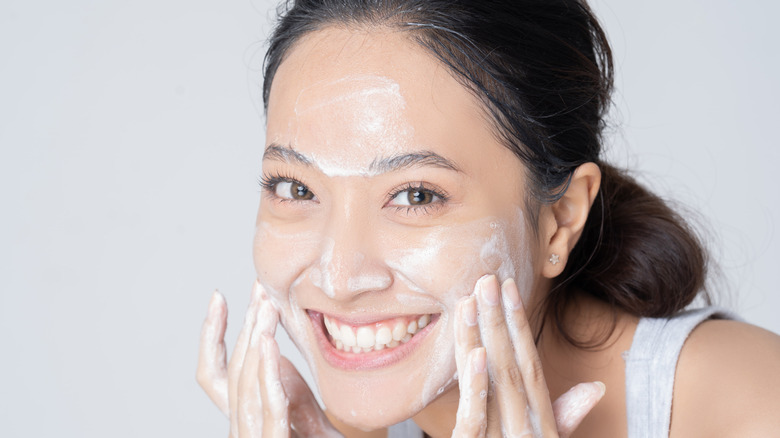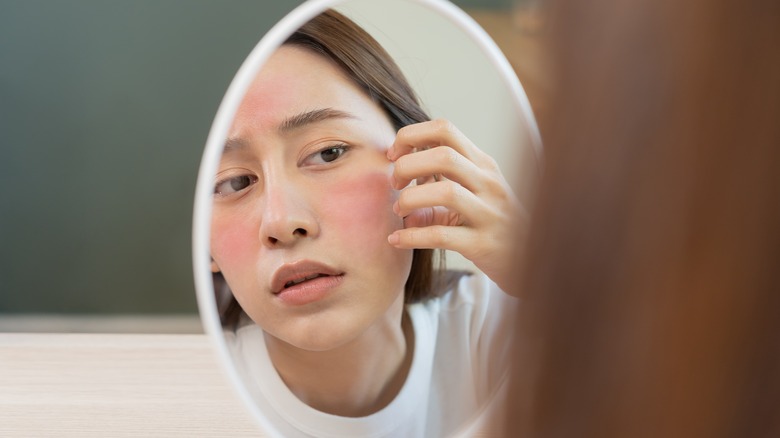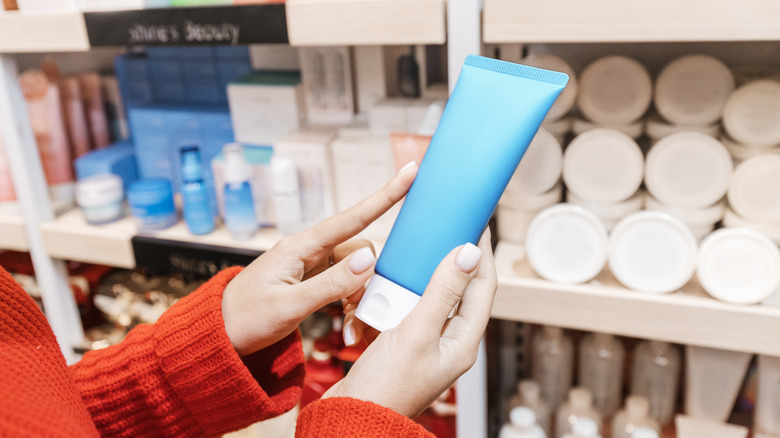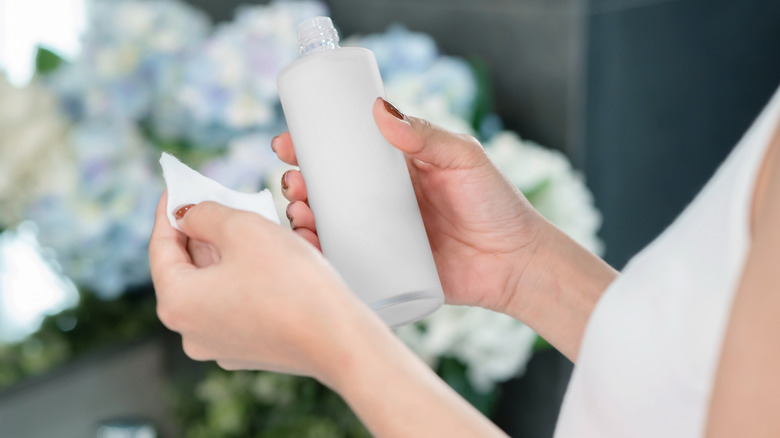A Cosmetic Surgeon's Best Recommendations For Taking Care Of Combination Skin
Believe it or not, there are five main types of skin: normal, sensitive, oily, dry, and combination, all of which are determined by the amount of oil, or sebum, your skin produces (via Today). While your skin naturally produces oil to keep itself hydrated and moisturized, having too much or too little can throw your skin off balance. For instance, oily skin occurs when your oil glands secrete an excess of oil on the skin. This can cause a thin layer of oil to form on the surface of the skin, which can increase your risk of acne breakouts.
Dry skin, on the other hand, occurs when your glands don't produce enough oil, leaving your skin dull and dehydrated. This can cause your skin to itch and flake off. Combination skin, however, is a unique mix of the two. In an exclusive interview with Health Digest, Dr. George Bitar, a board-certified plastic surgeon in Washington, D.C., explains what combination skin is and shares which skin care products work best for those who have it.
What is combination skin?
According to Dr. Bitar, combination skin is a common skin type that shares a range of characteristics of both dry and oily skin. "Combination skin typically consists of dry and oily features, which can change between seasons," Dr. Bitar says. "Skin usually presents with flaking, dry skin on the cheeks and oil and shine on other areas of the face, especially the T zone." The T zone is the area of the face that consists of the forehead, nose, and chin. It's also common for people with combination skin to have rather large pores and an oily or congested T zone area.
Another possible sign of combination skin is dandruff — a condition that causes skin to flake off your scalp and face. While dandruff on its own is not usually an indicator of combination skin, experiencing dandruff alongside acne breakouts is a sign that you might have combination skin. "Although genetics play a significant role in determining skin type, environmental and hormonal factors can also influence it," Dr. Bitar shares.
What are the best products and treatments for combination skin?
If you have combination skin, Dr. Bitar recommends using skin care products that can thoroughly cleanse and properly hydrate the skin on your face. For instance, the best products for combination skin include gentle foam cleansers, vitamin serums, and hydrating moisturizers. Dr. Bitar says that calming facial cleansers can help "wash away impurities without stripping the skin's natural oil" and even help reduce redness. In addition, facial serums that contain vitamins C and E can help brighten your skin and improve its overall appearance.
Furthermore, hydrating moisturizers packed full of powerful peptides, vitamins, and antioxidants can help hydrate your skin and delay or reduce the effects of aging. It's also important to wear sunscreen to protect your skin from sun damage. Besides store-bought products, however, there are also some in-office treatments that can help improve the quality of your skin. "For combination skin, we recommend Hydrafacials for mild exfoliation and delivery of key antioxidants and vitamins," Dr. Bitar explains. "Chemical peels are another excellent option for exfoliation and improvement of discoloration and texture."
Which products should you avoid?
It's also best to avoid certain skin care products if you have combination skin. According to Dr. Bitar, you should steer clear of any products that might further irritate your skin. "Avoid products with excessive irritants or fragrances, as well as 'harsh' products that contain alcohol, which can dry and aggravate oily skin," Dr. Bitar shares. "As a result, oily parts produce excess oil, and the dry areas increase, leading to breakouts."
As it turns out, fragrances are actually one of the leading causes of contact dermatitis, which can cause your skin to appear red and inflamed. Fragrances can also aggravate and exacerbate other chronic skin conditions, like eczema and psoriasis, due to the volatile chemicals used to make them (via Insider). Alcohol, on the other hand, can be very drying and irritating and cause damage to your skin's natural barrier. Commonly found in products like toners, soaps, and cleansers, alcohol can also make it difficult for your skin to retain moisture.
What's the best skin care routine for combination skin?
Aside from using the right skin care products for your combination skin, it's also important to establish a regular skin care routine in order to help keep your skin hydrated and free of excess oil. "Cleanse your face in the morning to wash away residue that built up overnight," Dr. Bitar says. You can also use alcohol-free toner to help remove any leftover oil your cleanser didn't get rid of.
After this, the next vital step in your morning skin care regimen is to moisturize. "Use a heavier moisturizer on dry facial areas and a lighter, water-based formula on more oily areas, such as the T zone," Dr. Bitar adds. "After moisturizer, apply sunscreen with an SPF of 30 or higher all year round." Be sure to repeat these steps before going to bed at night. It can also be helpful to gently exfoliate once a week to help unclog your pores and remove any dead skin cells. Using a retinoid can help yield the same results.
To learn more about Dr. George Bitar, go to Bitarinstitute.com or find him on Instagram @thebitarinstitute.





